
Roger Federer - The man one simply can't hate
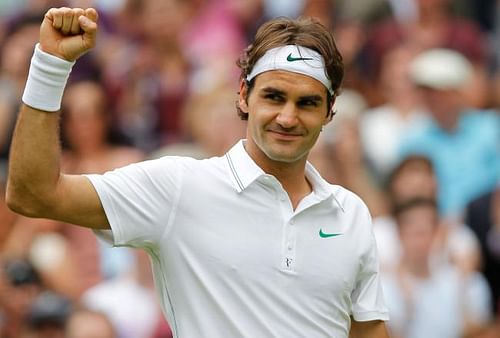
Roger Federer
It was just another day at work for Roger Federer. Having won the Dubai Duty Free Tennis Championships two weeks ago, it must have seemed like a drop in the ocean for a man whose achievements have been colossal, to say the least.
77 titles in the Open era of which 17 are Grand Slam titles (the highest by any player), the only player to win three or more consecutive Grand Slam titles twice (2005 Wimbledon, 2005 US Open, 2006 Australian Open, and 2006 Wimbledon, 2006 US Open, 2007 Australian Open), 52 hard court titles (again, the highest by any player), and many more. Greatest player of all time or not, the statistics speak for themselves. However, the multi-faceted personality that he is, there’s much more to him than these records; something that makes him more adorable.
Federer first came onto the scene in 2001 as a 20-year-old when he made his first Grand Slam quarterfinal at the French Open. In the same year, at Wimbledon, he defeated 4-time defending champion Pete Sampras to reach the quarterfinals. The world was witnessing a prodigy in action. Numerous titles followed and before the world knew it, the pony-tailed guy right there had become one of the masters of the game.
As every player goes through testing times at some point in their lives, Federer, being human, did too and is still going through that phase. It’s natural for an athlete to lose his pace and stamina as age catches up with him. But Federer has done a tremendous job of maintaining his fitness when there’s competition from a beast of a player like Rafael Nadal and the ever-intimidating Novak Djokovic.
Nothing in the world could unsettle Federer on the court. His calmness on and off it is second to none. He, for one, never vents out his frustration on any of the officials on the court. But, like everyone else, there came probably the worst day in his playing career after his 2009 Australian Open final loss at the hands of Nadal. “God, it’s killing me,” he said in his post-match speech, and broke down. He kept crying like a teenager who, in spite of trying everything, cries after failing to meet his loved ones’ expectations. Even after this, he smiled when Nadal put his arm around his neck. “I will try again,” he said. “I don’t want to have the last word. This guy deserves credit,” he congratulated Nadal. If anything, the honesty could be seen in him.
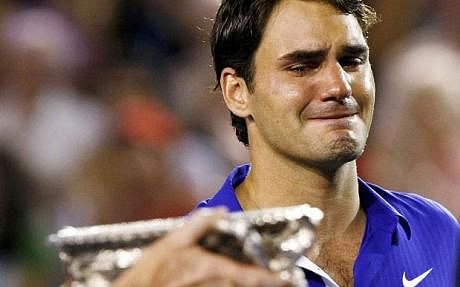
Emotional: Roger Federer cries as he watches Nadal being handed the trophy
The nadir in his game was his second round loss to Sergiy Stakhovsky at Wimbledon in 2013. Everyone thought his end was imminent and that it was the right time for him to hang up his racquet. But his post-match interview gave even the despondent some hope.
“You don’t panic at this point, that’s clear,” Federer stated. “You just go back to work and come back stronger really. It’s somewhat simple. It’s hard to do sometimes. But usually, I do turnarounds pretty good. I’m looking forward to what’s to come. I hope I can play a good summer, a good end to the season. This is clearly not what I was hoping for here today at this tournament.”
Though he played in a number of tournaments later, including an Australian Open semifinal against Nadal that he lost, another proud moment for him came when he won the Dubai Open in March 2014, having beaten Djokovic in the semifinal. Federer had a moment of absolute magic in that match when he got a point out of nowhere that brought the crowd on its feet and even left Djokovic applauding him. The chant of “Roger, Roger” reverberated inside the court.
Even when he kept moving from one part of the world to the other, participating in a number of tournaments from Indian Wells in California to the Australian Open, he had his wife, Mirka Vavrinec, giving him moral support through thick and thin. Looking at his wife and kids in the stands gives you a glimpse of how he, in spite of the success he has had, has never let family take a backseat. Federer, with twin children and expecting a third (maybe fourth as well) has proved how he is a family man even while competing at the top level.
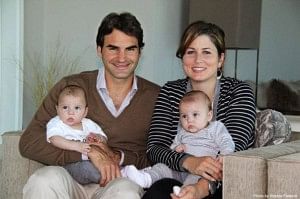
Federer with his wife and kids
With more than $1 million spent on education, he has a foundation named Roger Federer Foundation that works for the welfare of the underprivileged children in Switzerland, Zambia, Botswana, South Africa, Zimbabwe, Malawi, and Ethiopia. With an aim to reach a million children by 2018, he has a vision, and a vision that he tries to accomplish by personally visiting the children in these countries and interacting with them. For all his philanthropy, one can juxtapose the word ‘simplicity’ and Roger Federer.
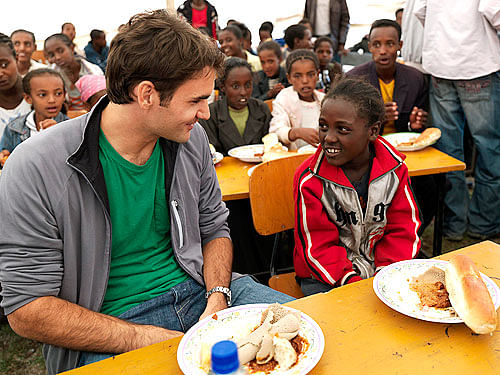
A modest Federer in his initiative through the Roger Federer Foundation
Federer’s magic is such that in 2007, he became the first living Swiss person to be featured on a Swiss stamp. The postage picture features Roger holding the Wimbledon trophy.
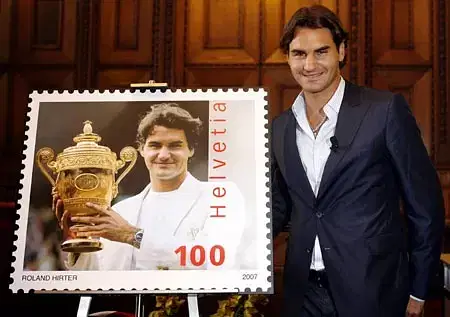
Roger Federer has always been a subject of admiration for the fans and the players alike. Even the rivalries have not stopped him from getting the plaudits by the tennis greats.
“In an era of specialists, you’re either a clay court specialist, a grass court specialist, or a hard court specialist…or you’re Roger Federer” - Jimmy Connors (Former world no. 1, eight Grand Slam singles titles)
“He’s a real person. He’s not an enigma. Off the court, he’s not trying to be somebody. If you met him at McDonald’s and you didn’t know who he was, you would have no idea that he’s one of the best athletes in the world” - Andy Roddick (Cincinnati, 2005)
“This is a guy who buys drinks for photographers and thanks reporters who show up for his press conferences” - Swiss sportswriter, Rene Stauffer
A lot of athletes give up when their bodies don’t respond to the physical demands of the game. When they win nothing, they feel it’s the end of their era and gradually ease into retirement. However, Federer hasn’t been one of them. He has never retired hurt during the match in his whole life. That speaks volumes about his fitness levels.
Everyone hopes he keeps playing till his body doesn’t give up. Every Federer fan, or rather, tennis fan, wants that. It’s hard to speak for everyone, but when he retires, a part of me will be disheartened. Those powerful single handed backhands that kiss the touchlines and storm past his opponents, the out-of-the-box tweeners which leave the spectators awestruck, the drop shots that leave his opponents shake their heads in disbelief, his cool-as-ever temperament; everything will be sorely missed. Tennis will never be the same anymore.
No matter how big a Nadal fan one is, no matter how fierce their rivalry still is, Federer is seldom hated by anyone. Even in all the defeats when he is outplayed by his opponents, he always gives them credit where it’s due rather than blaming himself for his performance. There’s not even a hint of hubris in him.
“Sometimes you’re just happy playing. Some people, some media, unfortunately, don’t understand that it’s okay just to play tennis and enjoy it. They always think you have to win everything, it always needs to be a success story, and if it’s not, obviously, what is the point? Maybe you have to go back and think, why have I started playing tennis? Because I just like it. It’s actually sort of a dream hobby that became somewhat of a job. Some people just don’t get that, ever.”
- Roger Federer on being asked about retirement (ATP World Tour – Shanghai, 2012)
Yes, winning is important for him and he is very driven. But his love and respect for the game is immense. This is why he doesn’t let criticism take a toll on him when he loses. Besides, he is often puzzled by how obtuse everyone is when they start talking about retirement whenever he loses. Is it that difficult to understand that the greatest player ever may also have the greatest love for the game?
There is no doubt that the days of those lip-smacking Federer-Nadal Grand Slam final face-offs are long gone. But for some, just watching him play gives them much needed satisfaction. The absence of the aura of invincibility about Federer doesn’t concern his fans anymore. Such is his class. Even with the fame and success he’s tasted all his life, he epitomizes modesty. In Roger Federer, there lies a man one simply can’t hate.